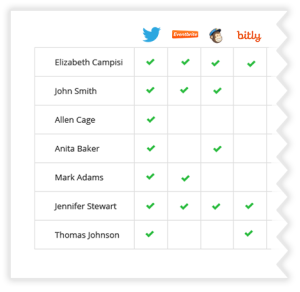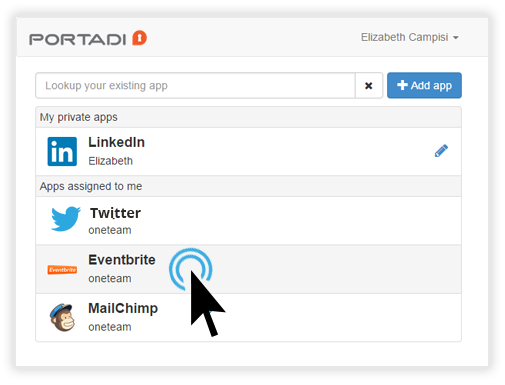Meet Portadi: The Czech Startup Making Group Logins Easy and Secure
So much of our work is in the cloud these days, especially at StartupYard, that one of the biggest headaches we used to experience, on an hourly basis, was maintaining our browser sessions with an ever-expanding list of cloud apps to log into. When we need, as a team, to be able to check Twitter and Buffer, copy something into our WordPress, then link a blog post to a mailchimp template, while also suddenly remembering to finish that eventbrite…. well, having to lookup our passwords on a spreadsheet is not only unproductive, but maddening.
And worse, that spreadsheet is not particularly secure- particularly if it’s disseminated via email, and sits on every computer in our team. What if one of the team members were to leave one day? It would take us weeks to change all those passwords, and meanwhile, they’d have access to all our cloud apps. They’d have the keys to everything. No more of that. Introducing Portadi: the secure cloud access tool for teams.
StartupYard has been a pilot user of Portadi since this past autumn, and we’ve been impressed. I caught up with Co-Founder CEO Dusan Vitek, who started Portadi Co-Founder and CTO Tomas Soukup, to chat about the tool, and their future plans as a company.
Hi Dusan, tell us a bit about Portadi. Where did the idea come from?
The cloud is a huge construction site. It looks like Berlin nowadays, there are cranes everywhere. In my last team we had about 50 cloud apps and accounts, almost everything we touched was in the cloud. It took a frustratingly long time to set up a new hire or freelancer properly and it was even harder to disconnect people from everything. For all of us who rely on cloud apps, wouldn’t it be cool to have all business accounts in one place from day one, ready to go? That is not happening in most organizations today. I knew we can fix that for a lot of teams around the world and that’s why we started Portadi.
The StartupYard team has been using the app for a few months, and we love it so far. It saves me at least 15 minutes a day when I’m using it. How does it compare with some of the other team password tools on the market?
“We aim to remove passwords from our workflow”
Password managers are a duct tape. They all have been designed for individual users to help them store their credentials. We don’t see it that way. We aim to remove passwords from our workflow. Portadi is an access panel for cloud apps, your VIP entry card for workplace apps.
Portadi saves you time because it’s your personal gateway to all workplace cloud apps. Portadi saves you money because it shows how much your paid subscriptions are used. Portadi gives you security because it eliminates login credentials for 50 work apps and replaces it with a single set of credentials for everything.
Will Portadi stay a small-business solution, or do you plan to target larger companies as well?
We’re designing Portadi for workplace teams. App management is not just a problem of small companies or large companies. It’s a common problem in any team that relies on third-party cloud services like Salesforce, Office Depot, or your hosting provider.
Large companies are being served by other identity and access management vendors like Microsoft, Oracle or Computer Associates. They mostly play in the on-premise market but have weak offerings in cloud app management.
But large enterprise customers are not immune to the cloud. Yes, three years ago if we got a meeting with a large vendor, we would go home with a 100-page document listing all of the requirements we had to fulfill. But that has changed. In most cases what they buy as a service is an app, it’s not infrastructure.
Where passwords are concerned, security is always at the front of people’s minds. You expect customers to share their logins for key social media accounts, and other sensitive access information. What kinds of measures do you take to make sure the platform remains secure?
We have 13 years of security experience building host-based and gateway firewall products so we take security very seriously. Application credentials are encrypted with AES 256 before we ever store them in the database. All communication between the Portadi secure cloud and Portadi browser extensions is encrypted using TLS. We audit all access attempts to the Portadi cloud and scan for unusual behavior. And we offer 2-factor authentication into Portadi which by extension we provide to all services that you access through Portadi.
So by using Portadi, a group can potentially increase the security of their passwords?
Yes, you can keep your passwords secret. Instead of giving your new colleague 50 passwords for 50 different services, you give her just one password and one Portadi access panel. She won’t know the passwords for any of those 50 services, Portadi will be her only gateway. It totally rocks for shared passwords because any change affects many people.
As simple as Portadi is, do you think it will be a challenge to monetize? How have you gone about tackling this issue?
We are a freemium product, you can start for free. The service costs $2 per user per month. It was important for us to test pricing early on and while some people think it’s inexpensive, most customers tell us that the price is fair. We rolled out the paid plan in February this year and got first paying customers that month. Portadi saves a lot of money and headaches for customers who use it.
Tell us a bit about the Portadi team.
Tomas does the coding, I do everything but coding. I think what makes us a really great team is the shared passion for great products and delightfully simple user experience. Tomas likes things pretty straight up and to the point, I – being a marketer – tend to elaborate more. We find a happy medium most of the time.
We hear that you’ve just started an accelerator program with Microsoft. Can you tell us anything about that?
Yes, Portadi got into the final elite group of eight startups who joined the Microsoft Ventures Accelerator in Berlin. There were over 500 startups trying to get in so we are obviously very happy. Microsoft provides office space, mentorship, credits for Microsoft technology, access to venture capital, and the all important foosball table. Oh, and just the other day they got us new gigantic desk lamps which look like construction cranes. Somehow it’s quite fitting with the whole Berlin scene.
Are you currently looking for investors? What’s coming next in Portadi’s development?
Yes, we are open to partnering with investors who understand our business. But right now we are heads down building an awesome product. Most of our customers are on Google Apps, so we’re exploring some tighter integration.








